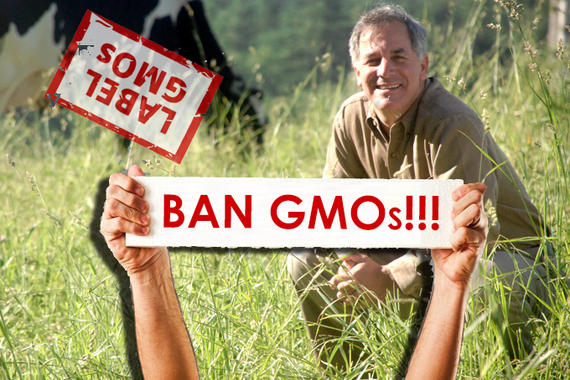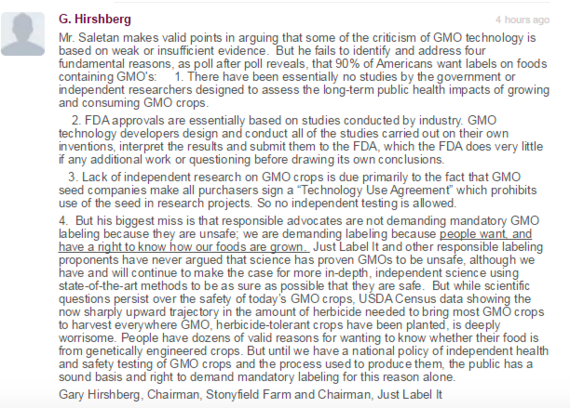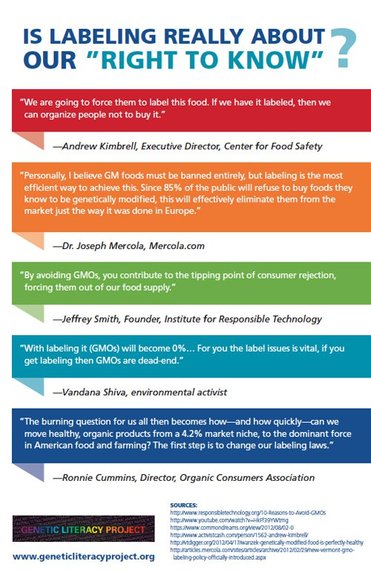
Co-Author: Bruce Chassy, professor Emeritus of Food Safety and Nutritional Sciences from the Department of Food Science and Human Nutrition at the University of Illinois at Urbana-Champaign
For years, the leadership faces of the anti-GMO community and the mandatory labeling movement--and make no mistake they are one and the same--have been a remarkably motley crew.
It consists of a blustering economist (Naseem Taleb); a former flying yoga instructor (Jeffrey Smith); a computer scientist who publishes anti-GMO screeds in pay-for-play journals (Stephanie Seneff); an engineer with no food or genetic expertise who claims to have developed email (Shiva Ayyadurai); a talk show doctor (Mehmet Oz); an Indian Brahmin philosopher who pretends to be a physicist (Vandana Shiva); and a French geneticist whose body of work has been rejected by mainstream scientists around the world (Gilles-Éric Séralini). Not a very inspiring group.
Over the past year, however, a fresh face has emerged: Gary Hirshberg, the chairman of Stonyfield Organic, which produces a variety of signature organic dairy related products, and is one of the pioneers what used to be called the "socially responsible business" movement. He is also head of Just Label It, which champions labeling of GMOs and campaigns that GM foods could pose serious health and environmental problems. He has emerged as the point man in Washington on the debate over GMO food labeling.
Hirshberg is apoplectic about the recent vote by the US House of Representatives to pass a bill that if passed by the Senate would open the door to voluntary labeling of GM foods and block states from imposing mandatory labels. But what really exercised the organic foods leader is a recent article in the Washington Post-owned Slate by William Saletan that excoriated anti-GM activists--which would include Hirshberg--for being ill-informed and maliciously deceptive in their campaigns to demand labeling as a not so hidden step in their effort to demonize GMOs, and shut down the science of the genetic modification in food and agriculture.
"The crossfire on whether or not to require mandatory labeling of GMOs has become so heated and partisan that it's hard to discern the facts from rhetoric," Hirshberg wrote in a Huffington Post blog on July 21 headlined "Mandatory Labeling--It's Your Right to Know." "The latest volley was last week's essay that challenged labeling proponents' lack of substantive proof that GMOs are unsafe or unhealthy."
The article was a slightly reformulated version of a reply Hirshberg had posted to the Saletan Slate piece, reproduced below: 
Hirshberg's framing of the GMO debate and the controversy over labeling cries out for a response.
We--Jon Entine, Executive Director of the Genetic Literacy Project and a Senior Fellow at the World Food Center at the University of California-Davis, and Bruce Chassy, Professor Emeritus of Food Safety and Nutritional Sciences from the Department of Food Science and Human Nutrition at the University of Illinois at Urbana-Champaign--reviewed Hirshberg's two posts.
From whom we seek advice, expert guidance, and evidence is critical since it influences what we believe. A review of Hirshberg's comments here and in prior statements suggests that he has been listening not to voices of established, independent scientists but to ideologues more committed to a cause than the truth. Bruce Chassy and I decided to write this open letter and critique of Hirshberg's views with the hope of prompting a genuine dialogue with Gary, based on the most robust independent science by the best scientists at the world's most prestigious science organizations.
Hirshberg Point 1: There have been no independent studies of GMO safety
Factually not true.
If Hirshberg is making the point that no, we didn't put 10 humans in one box and feed them non-GMO foods, and 10 in another box and feed them GM foods for a lifetime to see if there were any long term effects, then he has a case. But that's now how food studies, on GMOs or anything else, are done or should be done. Keeping in mind that expert panels at the National Academy of Science, Royal Society (UK) and more than 100 other independent science organizations from around the globe have not identified any unique risks associated with GM foods, one has to question just why Hirschberg or anyone else would demand expensive long term studies--unless his intention was simply to mislead and scare less expert audiences. A poll by the independent PEW Foundation of independent scientists with the American Academy of Sciences found 88 percent embraced the consensus that GM foods or as safe or safer than other conventional or organic foods, a stronger consensus than for a belief in human-induced global warming.
Good studies start with a scientifically reasonable hypothesis. Feeding humans or animals GM foods for long periods of time just to see what happens is exactly how not to do a good experiment. There is no hypothesis being tested. Such experiments are simply data dredging operations which are highly likely to find false correlations between food and health. Safety scientists rely instead on careful studies of any changes in composition, nutritional value, and allergenicity among others; they also directly test the safety of any new traits introduced into the crop. These studies cost 10s of millions of dollars and take years to complete. It is disingenuous to suggest that proper studies have not been done.
What independent studies have been done?
Hirshberg claims there have been no government or independent studies into the long-term safety or impact of GMOs. In fact, there have been more than 1,000 peer-reviewed, published papers from independent sources on GMO plants involving their human, animal and environmental safety and efficacy. The European Union, which nobody can claim is in the pockets of the GMO industry, has conducted extensive reviews--hundreds of them--and found GMO plants to be as safe as any other.
Here the respected independent site Biology Fortified announces its launch of the GMO study data bank known as GENERA, which details the prevalence of independent GM crop research.
- New resource shows half of GMO research is independent (Aug 2014)
- About those industry funded GMO studies (Feb 2014, but not a PDF)
Our guess is Hirshberg is trying to turn on the issue of "long term." In the science community, 90 day studies of rats are considered long term. That said, there have been several multigenerational studies which failed to show any difference between GMO-containing and non-GMO diets. There have also been more than 50 studies of longer than 90 days, up to two years, (Genetic Literacy Project provides examples here), all finding no unusual safety concerns. In contrast there has been only one paper in a prominent peer reviewed publication raising red flags: Gilles-Éric Séralini's withdrawn study subsequently republished without peer review in a marginal journal.
But even the Séralini study found no adverse effects linked to GMOs. Analyzing his published data, the only significant finding was that female rats feed the herbicide glyphosate, sometimes used in tandem with some GM crops, lived longer than other groups. An objective scientific team might have made note of the life-extending effect of glyphosate; of course we know that's silly but it's a good indicator of a faulty experiment when the researchers fail to report their own data openly and honestly.
Also, we have almost 20 years of data monitoring animals who have been fed GMO feed since 1996. Absolutely zero issues of unusual problems have been observed despite several trillion meals fed to billions of animals. If there were any health issues, they would have shown up in the monitoring before and after data shown here.
Note that Hirshberg doesn't address the fact that the broad consensus of the science community is that GM foods are safer than conventional/organic foods because of the extensive safety testing, particularly of allergens. Would peanuts or kiwis be approved if they were the result of GM? Never, because of the high prevalence of allergy causing proteins, but they get a free pass in our current system that regulates GMO crops more stringently than conventional ones. Check out this Boing Boing article on conventionally bred, poisonous potatoes. It's the a good case study for illustrating how unbalanced the scrutiny is on GM crops as FDA doesn't review conventionally bred plant.
In 2004, a National Academies panel on the unintended health effects of genetic engineering reported that conventional potato breeders continue to try to increase the amount of solanine produced by the leaves and vines of their potato plants in hopes of making those plants more naturally pest-resistant. Because of that, the USDA actually has a recommended limit for solanine content of new potato varieties -- but that limit isn't strictly enforced. Gould's point isn't that genetic modification is always better than conventional breeding. It's not. Instead, they're both tools -- imperfect technologies that could produce unintended side effects. Which one you choose to use depends on what you're trying to do. But, either way, you can't say that one is scary and one is safe....
Hirshberg Point 2: GMO approvals are based on studies conducted by industry
Factually not true.
The FDA does only a cursory review of these studies? Its review process take multiple years and involves transparent public review and comments prior to approval of any GMO crop. None of Hirshberg's organic products undergo any such similar scrutiny and they aren't required to be mandatorily labeled - and likely Hirshberg and his organic allies who are demanding mandatory GMO labeling would oppose such mandatory identity tracking of organic foods. There is of course no testing or tracking of 3,000 foods/crops genetically modified through mutagenesis. Here is an article by Nathanael Johnson in Grist that addresses, and dismisses, Hirshberg's deceptive claim. Geneticist Val Giddings also addressed this in detail in public testimony on the Connecticut labeling bill.
Setting aside the fact that the FDA review process involves the FDA interacting with the developer for several years which gives them an opportunity to direct the developers' safety studies in order to answer FDA's scientific questions before a formal review starts, it's worth noting that these same products approved by FDA also pass rigorous multi-year mandatory reviews in Japan, Korea, Australia, Canada, China and dozens of other countries. It is misleading to suggest that FDA just gives them a quick pass. Actually it's a lie.
Hirshberg Point 3: Seed manufacturers enforce patent agreements that insure non-independent research of GMO crops
Factually not true.
The first thing that needs to be said to this point is that companies regularly provide new GM products for independent testing. The only thing researchers have to agree to in writing in a formal technology use agreement is that they follow all the containment and safety procedures that apply to GM crops and that they not plant them commercially nor pass them along to other researchers or growers. Companies also require that the researchers they provide samples to have no conflicts of interest, are qualified to do such studies, have a track record of publishing good science, and have no obviously disqualifying anti-GM bias. It should come as no surprise that companies are reluctant to provide experimental material to critics with a poor track record for doing good science who distort the truth about their products.
Independent tests are also done by researchers in countries that require the government or selected labs to independently verify the developers' claims. As noted above, EU has published hundreds of papers on GM safety. Consequently, there are literally hundreds of peer-reviewed studies that confirm the conclusions reached in studies funded by developers of GM crops. All of these studies required access to GM products--the same products that Hirshberg incorrectly claims are not available for independent study. There are also a few dozen papers published by anti-GM researchers--often sponsored by anti-GM groups or companies that stand to profit from anti-GM propaganda--that have obviously had access to GM products.
Are technology use agreements overly restrictive? Apparently not for Stonyfield which has strict language about anyone using their proprietary intellectual property on their own website. Google "Stonyfield" and "licensing agreement" to see the numerous use agreements they have with various partners. Do intellectual property laws only apply for organic companies?
Hirshberg Point 4: Mandatory labeling is not unique and people overwhelmingly want to know how are food is grown
Factually deceptive.
There are many things that consumers may wish to know. The FDA mandates that manufacturers provide basic information that a consumer should and sometimes must know (identity, size, ingredients or contents, nutrition facts, and who to contact if there is a problem). All other information such as whether a product is kosher, organic, or vegan is voluntarily placed on products by manufacturers to serve specific consumer preferences and markets. In this regard a consumer wishing to avoid GM foods can do so by purchasing any of the more than 25,000 products labeled GMO free or, alternatively they can buy any organic product.
In his Huffington Post piece, Hirshberg tries to draw parallels in the mandatory labeling of orange juice concentrate or wild vs. farmed fish, which has nothing to do with food safety, and the proposal to require labeling of GMOs.
[T]here is a long history of government-enacted labeling disclosures that have nothing to do with safety concerns. There are no unique risks associated with orange juice "from concentrate" compared to fresh juice, or from "wild caught" vs. farmed fish, but both require labeling so that consumers can choose.
But these are flawed analogies. Let's examine the case of orange juice to explain. Orange juice reconstituted from concentrate is a materially different product than freshly squeezed juice while, for example, sugar made from genetically modified sugar beets and conventional sugar cane or sugar beets are materially indistinguishable.
Orange juice "from concentrate" is altered and reconstituted and also has quality and cost differences from fresh squeezed that impact both consumers and producers. Prior to the required "from concentrate" label, consumers were deceived into buying juice they thought was "fresh" and not reconstituted...one is more expensive to produce than the other. So, producers who sold fresh were disadvantaged and challenged to compete with cheaper reconstituted juice made from concentrate when there was no required distinction yet the "from concentrate" could sell for much less than fresh squeezed.
No there wasn't a safety difference, but there were clear and compelling economic and quality factors that merited the "from concentrate" distinction as it was a processing step, which impacted quality and cost of the end product sold. GMOs are a production (not end product processing) step which does not alter the quality of the end product sold and does not deceive consumers or harm producers competing against it unfairly in any way.
Hirshberg makes no rational case for mandatory labeling because giving people choice is not his objective. The leading anti-GMO activists that Hirshberg stands arm-in-arm with at public events and in written articles claim to support a "right to know" but that is a lie, and Hirshberg knows it. Here is a an infographic (pdf here) put together by the Genetic Literacy Project, with actual quotes from "right to know" advocates caught off guard being candid about their true intentions:
For article link click here
Gary, what's happened to you? You do not sound like a reasoned and wise CEO--the Hirshberg that was a leader in corporate social responsibility in the 1990s--but a shrill propagandist. A reactionary.
Genetic modification is one tool in farmer's tool-box. Don't demonize it. Join with the American Medical Association, National Academy of Sciences, American Association for the Advancement of Science, European Commission, Royal Academy of Science and more than 100 of the world's most prestigious independent science organizations--and every major liberal media outlet in the United States--in standing up for science rather than for Gilles-Éric Séralini.
Smart people, ethical people, socially responsible thought leaders have the courage to change their minds when presented with the evidence.
Gary, other thought leaders in the environmental movement have closely examined the evidence on GM crops, looked closely at the science, consulted the world's top scientists and ultimately changed their views: Patrick Moore, Mark Lynas, Stewart Brand and most recently Bill Nye. That took courage and ethics.
Gary would you be willing to engage in a dialogue on these issues? Talk to independent scientists? Discuss the issues with others who have been open to empirical evidence? To whom you listen does make a difference.
Please contact us.
Jon Entine, executive director of the Genetic Literacy Project, is a Senior Fellow at the World Food Center Institute for Food and Agricultural Literacy, University of California-Davis. Follow @JonEntine on Twitter
Bruce Chassy, professor Emeritus of Food Safety and Nutritional Sciences from the Department of Food Science and Human Nutrition at the University of Illinois at Urbana-Champaign; he served as the Assistant Dean for Science Communications in the College of Agricultural, Consumer and Environmental Sciences and was head of the Department of Food Science and Human Nutrition at the University of Illinois from 1989 to 2000. Follow him on Twitter: @BruceMatthewCha
